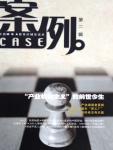Chapter 1 Editor-in-Chief's Words "Blue Lion Guidelines" for Company History Creation
Case Study (Second Series): Past and Present of "Industrial Opportunism"
吴晓波
1355Words
2018-03-18
The publication of the first series of "Cases" has aroused different reactions in the media, business circles and business schools. Regarding the standardization of case creation, everyone has their own reactions due to their different professional roles.To the editor, all comments are welcome.Because, only in this way can we continue to make progress.As Richard Tedlow, professor of American business history, said, "All business activities are money games based on certain principles." Essentially, all cases are stories, and their value It is the immediacy and excitement of these stories, and the inspiration it produces for readers and learners.In "Cases," we try to forge a new path between news stories and business school cases, which in our opinion lack the format of research, and which seem to have no meaning for public reading.
In order to edit "Cases", we have extensive contacts with outstanding domestic corporate history authors, because a good corporate history itself should consist of ten or more fascinating cases.And in the writing of company histories, we try to establish some guidelines, in such a noisy and impetuous world of business writing and reading, we want to use these guidelines to keep ourselves sober and independent, even if it will cost us a lot or make us lonely .
"Try to go into the company archives."
Own as much first-hand material as possible.In the Internet age when Google became a library, it is not difficult to create a company history by editing and piecing together public materials.However, in the vast majority of cases, company histories "created" without direct, in-depth investigation are of little value for publication.We hope that the cases or stories you read here are fresh and true.
"One step away from the company."
Creational independence is a prerequisite for any commercial historical value.Observing and thinking calmly one step outside the company will make the creation more valuable.It will be difficult to guarantee the objectivity of creation in the style of imperial writing and "insider style".Any serious business history creator will carefully deal with such a situation: get close to the company at zero distance, obtain as much real material as possible through authorization, and at the same time, keep one step away from the company in the creation, without losing the right real respect.
"Don't be fooled by the news events in front of you."
Any great or well-known company is often inseparable from a series of sensational news events, and these news whirlpools are also the focus of the creation of company history. However, creators must make a more objective and historical judgment on the influence of news , don’t be fooled by some unsettled events in front of you, these illusions will greatly distort your overall grasp of growth history, and overly impulsive and emotional judgments will make you fall into endless embarrassment in the future.
"Company privacy that has no public research value should not be exposed."
Not all company inside information is worth or should be disclosed. It is unfair to the researched companies and their owners and operators to require transparency of all company privacy, because it does not Take on the obligation to educate the public with your own growth experience.Defining "corporate privacy" is a very difficult matter, but it does exist on a moral level.
"An excellent company history must have its own coordinate system."
Any corporate history is contemporary history.Describing a company in which era and industry node is the starting point for the creation of most company histories. A company history without a sense of coordinates is a company history without public reading value.In many cases, it will have more realistic value to describe a large company through some kind of in-depth reading.In this sense, creators should not try to "end" a company with a book.
"Withstand the test of time for at least five years."
The vast majority of corporate history books are ephemeral works, and only a few classics can be passed down by luck.Rapid business changes make any company always face revolutionary innovations, which undoubtedly makes the creation of dynastic company history a challenge.Therefore, the possession of facts as detailed and comprehensive as possible and the calm and moderate multi-faceted comments have become the most basic gestures of creation.Perhaps, after a few years, these creations have become obsolete, but, at least for five years, it should stand the test of time.

